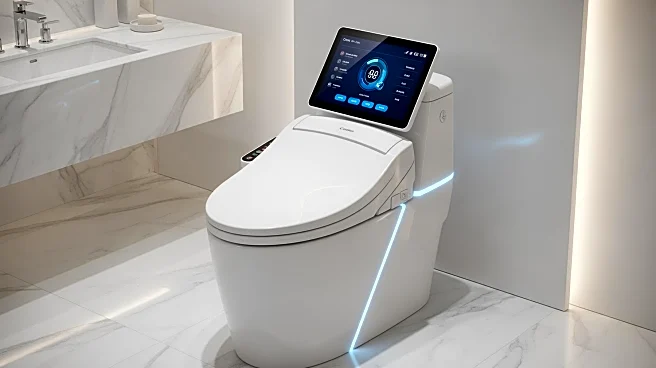What's Happening?
Kohler Co., known for its kitchen and bath products, has introduced Kohler Health, a new venture aimed at digital health and wellness. The company's first product, the Dekoda, is a smart toilet device designed to provide users with insights into their
hydration, gut health, and bloody stool through optical spectroscopy sensors and AI technology. The device attaches to the toilet rim and sends data to the Kohler Health app, which is encrypted for privacy. Although the Dekoda is not FDA-approved and cannot offer medical advice, it allows users to track health trends and lifestyle factors over time, potentially aiding discussions with healthcare providers.
Why It's Important?
The introduction of the Dekoda represents a significant advancement in personal health monitoring, transforming the bathroom into a hub for proactive health insights. By leveraging AI and optical spectroscopy, Kohler Health aims to empower consumers to better understand their health through everyday routines. This innovation could lead to more informed health decisions and discussions with medical professionals, potentially improving overall wellness. The device's ability to track trends and establish personal baselines offers users a unique opportunity to engage with their health data in a meaningful way.
What's Next?
Kohler Health plans to expand its offerings in the digital health space, with the Dekoda serving as a foundational product. As consumers begin to integrate this technology into their daily routines, feedback and data collected could drive further innovations and improvements. The company may also explore partnerships with healthcare providers to enhance the utility of the data collected by the Dekoda. Additionally, the success of this product could encourage other companies to develop similar health monitoring technologies, potentially leading to a broader shift in how personal health data is collected and utilized.
Beyond the Headlines
The launch of the Dekoda raises questions about privacy and data security, given the sensitive nature of health information. Kohler Health's commitment to end-to-end encryption is crucial in addressing these concerns. Furthermore, the device's reliance on AI and optical spectroscopy highlights the growing intersection of technology and healthcare, which could lead to ethical discussions about the role of non-medical devices in health monitoring. As the market for digital health products expands, consumers and regulators will need to navigate the balance between innovation and privacy.















